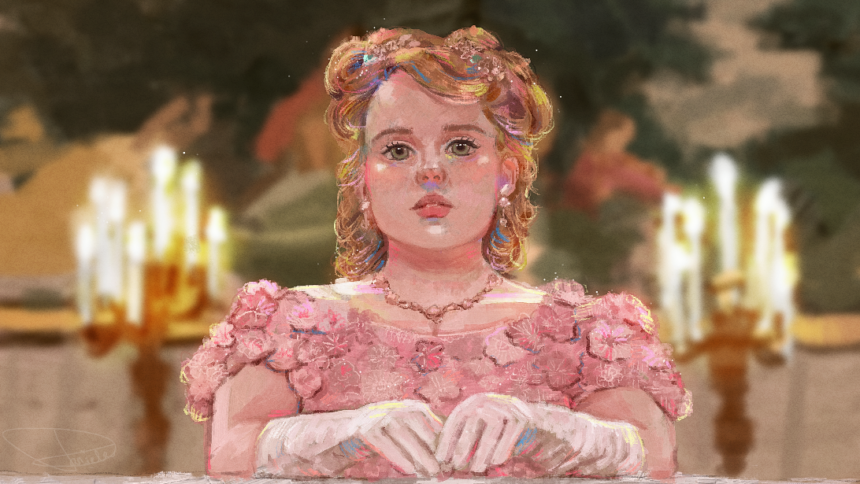Three Writing Lessons from Bridgerton Season 3
By Greer Macallister | July 1, 2024 |

Dearest Gentle Readers,
Hopefully those of you who enjoy televised programming have had the chance to finish the third season of Bridgerton on Netflix. While I always try to relax the writer part of my brain when I read or watch other people’s writing, it can be tough! Inspirations, observations and lessons keep sneaking through. So while I primarily enjoyed Penelope and Colin’s story for its own sake, I also noticed a few things that I felt might be useful for my own writing — and maybe yours?
Warning: spoilers for the entirety of Bridgerton Season 3 abound below!
The end isn’t always the end.
At the halfway point of the season, the key couple declared themselves to each other and the hero proposed marriage to the heroine. End of story, right? Nope, raising the stakes — because once Colin swore his love for Penelope, she had all the more reason to fear the revelation of her identity as Lady Whistledown because she might lose Colin as a result. You don’t want to give your characters everything they want early in the story, but neither do you want to hold off all the major action for the story’s climax. Ebbing and flowing action does wonders.
Villains need reasons.
One of my favorite writing guidelines (I won’t say rules) is that the villain is the hero of his own story, and it applies here to Cressida Cowper. She does a bunch of lousy things, endangering our favorite characters with her machinations from the first episode of the season to the last. Yet the show is careful to humanize her and show why she does what she does, struggling to escape a life she hates. No one sets out to write a cardboard villain, but many of them end up that way if the writer doesn’t do the work of giving them a complete set of circumstances, goals and desires. Sorry about your aunt, Cressida.
Use your cast.
With a sprawling cast like Season 3’s and the way that Bridgerton is structured, we spend a lot of time checking in on characters who’ve already had their day in the sun (Kate and Anthony) and future featured players (hey there Francesca), even if their plotlines sometimes feel like so much wheel-spinning (that was a lot of Benedict, in every sense). You may or may not have a cast this sprawling in your writing — my historical fiction doesn’t, my epic fantasy absolutely does — but when you do, it’s important to ask yourself a key question whenever you need a character to provide an action: can someone the audience already knows do this? We had to meet a lot of new people, but the action also got some goosing at key times from Lady Danbury, the Queen, and even Penelope’s mom, Lady Featherington. It’s going to be easier for your readers to keep track of characters you’ve already introduced, so if you’re going to bring in someone new, make sure they’re essential — and make them memorable.
Do you experience other people’s writing primarily as a writer, or are you able to turn off that part of your brain and just enjoy? Have additional takeaways after watching season 3 of Bridgerton? The floor is yours.










I may be the only person on the planet who hasn’t watched Bridgerton but your observations are wonderful, Greer. Once I read or watch something for enjoyment and actually enjoy it, I like to go back in and find out why. I’ve been re-reading novels in my genre specifically for character arc reasons these days. And I love that 10 second replay button on Netflix for catching mumbled dialogue. My husband stopped watching things with me because of this.
You’ve made some great points, Greer!
SPOILERS:
I’m afraid I didn’t love this season. It was clunky and unevenly paced, and the sprawling cast – which I very much loved in the first two seasons – mostly didn’t add much and knocked the tension completely off-kilter. Also, Eloise was too unforgiving and bratty, and suddenly gave up her passion for reading and writing???? This is what we loved about her. Strange choice. The queen had a bit of a redundant lackluster role as well. Colin was really awkward as a ladies’ man and while that was probably the point, it was hard to watch. It just didn’t ring true to who he was and made it hard to root for him. It would have made more sense to see him slowly discover his feelings for Penelope through jealousy with Lord Debling, rather than the whole “let me show you how to act” thing, too. Overkill. Ugg. I did like Cressida’s role this season! As you pointed out, she was a nice surprise as a villain and her character really evolved. I wanted way less of the Mondridges and that story about Benedict (it felt like a rerun of season two with the artists’ colony, really) and more Violet and Lady Danbury and her brother. I’m hoping for a much tighter season four! Season two was just so stellar that it was a tough act to follow, but I don’t know, it happens in good TV all the time.
Thanks for your thoughts today (and for listening to my Bridgerton fan-girl ramblings LOL)!
Greer, you make such important points here, and in such a fun way! The point about what your current characters can do rather than introducing extraneous new ones is just the reminder I need today.
Heather, you are so spot on with everything about this season. Exactly the way I felt. Colin and the ladies – super cringy!
I was long delayed in watching the second half so no one will probably read this comment. But in case someone does, I had read that if you feel that something is off in season three, it’s because they had a new show runner. This could explain some pacing issues.
Also, while I was firmly Team Pen & Colin and thought the impending Whistledown reveal created great ongoing tension (and unlike others I did think Eloise’s role worked), I do believe there was oversell on the part of the marketing crew, promising the “steamiest season ever.” Nope. While the heat level was just right for them, seasons 1 & 2 far outstripped (ha!) season 3. I think there’s a cautionary tale in this as to how we sell our novels as well.